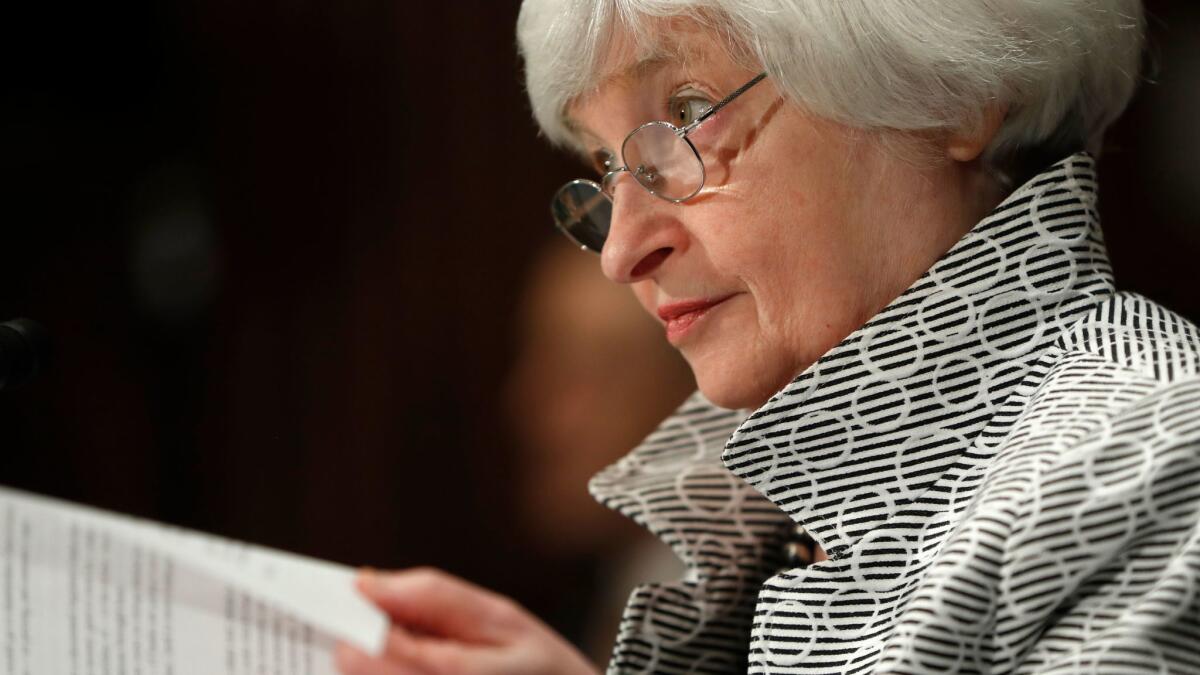Yellen defends tougher financial regulations, a move that could hurt her chance for renomination as Fed chair

Reporting from Washington — Federal Reserve Chairwoman Janet L. Yellen said Friday that tough new regulations have made the financial system safer with little downside, a strong rebuttal of Republican criticisms that reforms have stunted economic growth.
Yellen’s comments at the Federal Reserve Bank of Kansas City’s prestigious policy conference in Jackson Hole, Wyo., could hurt her chances of being renominated as the central bank’s chief.
Yellen’s four-year term as Fed chair expires in February. It’s unclear if President Trump — a sharp critic of the Dodd-Frank regulatory overhaul spurred by the 2008 financial crisis — will nominate her for another term or if Yellen is interested in serving one.
Trump has said he is considering Yellen and his top economic advisor, Gary Cohn, for the post. Cohn might not have helped his chances Friday as he publicly criticized Trump’s response to the violence in Charlottesville, Va.
But Yellen’s speech Friday likely didn’t help her case. The defense of the 2010 Dodd-Frank law puts her clearly at odds with Trump and most congressional Republicans.
“The events of the crisis demanded action, needed reforms were implemented, and these reforms have made the system safer,” Yellen said in prepared remarks to the conference.
Michael Gapen, chief U.S. economist at Barclays Investment Bank, said the speech was “a subtle shot across the bow” of Trump administration officials and lawmakers who would like to reverse many of the Dodd-Frank regulations.
“We think a chair expecting (or desiring) another term may have put forward a different message,” Gapen wrote in a research note.
Yellen acknowledged that some of the regulations “may be affecting market liquidity somewhat.” Some small businesses might find credit “less available” and mortgages might be tougher to obtain, particularly for people “with less-than-perfect credit histories,” she said.
The Fed is watching for adverse effects and considering some changes to mitigate them, Yellen said.
But, overall, most research “suggests that the core reforms we have put in place have substantially boosted resilience without unduly limiting credit availability or economic growth,” Yellen said.
Yellen reviewed the wreckage caused by the 2008 financial crisis, including the loss of nearly 9 million jobs, and warned of the consequences of forgetting the damage done to the U.S. and global economies.
“Already, for some, memories of this experience may be fading — memories of just how costly the financial crisis was and of why certain steps were taken in response,” she said.
The Republican-controlled House voted along party lines in June to repeal many of the Dodd-Frank regulations. Trump has promised to dismantle Dodd-Frank and Treasury Secretary Steven T. Mnuchin has proposed a major rollback.
Trump was highly critical of Yellen during the presidential campaign and analysts expect him to replace her, with Cohn as the leading choice.
Last month, Trump said Cohn, a former executive at investment bank Goldman Sachs Group Inc., was under consideration along with Yellen.
“I like her. I like her demeanor. I think she’s done a good job,” Trump told the Wall Street Journal. “I’d like to see rates stay low. She’s historically been a low-interest-rate person.”
Cohn might have roiled the waters on the choice of a new Fed chair with his criticism of Trump’s Charlottesville response.
In his first public comments on the matter, Cohn told the Financial Times in an interview published Friday that the Trump administration “can and must do better in consistently and unequivocally condemning” white supremacists, neo-Nazis and the Ku Klux Klan.
Cohn, who directs the White House National Economic Council and is helping lead the administration’s push for a tax overhaul, said he had “come under enormous pressure both to resign and to remain in my current position.”
The New York Times reported Friday that Cohn had seriously considered resigning and even drafted a resignation letter, citing two unnamed people familiar with the draft.
Cohn, who is Jewish, stood by Trump’s side during an impromptu news conference in New York last week in which the president said there were “some very fine people” marching alongside neo-Nazis in Charlottesville.
But Cohn said he was not leaving his White House job.
“As a patriotic American, I am reluctant to leave my post as director of the National Economic Council because I feel a duty to fulfill my commitment to work on behalf of the American people,” Cohn told the Financial Times.
“But I also feel compelled to voice my distress over the events of the last two weeks,” he said.
“As a Jewish American, I will not allow neo-Nazis ranting, ‘Jews will not replace us’ to cause this Jew to leave his job,” Cohn said. “I feel deep empathy for all who have been targeted by these hate groups. We must all unite together against them.”
Twitter: @JimPuzzanghera
ALSO
David Lazarus: Mnuchin’s wife isn’t the only one defining herself through the brands she promotes
U.S. imposes tough economic sanctions on Venezuela
1 million people pay nothing for cellphone service, so how does FreedomPop make money?
UPDATES:
9:45 a.m.: This article was updated with comments from Michael Gapen of Barclays Investment Bank.
This article was originallypublished at 8:40 a.m.
More to Read
Inside the business of entertainment
The Wide Shot brings you news, analysis and insights on everything from streaming wars to production — and what it all means for the future.
You may occasionally receive promotional content from the Los Angeles Times.











